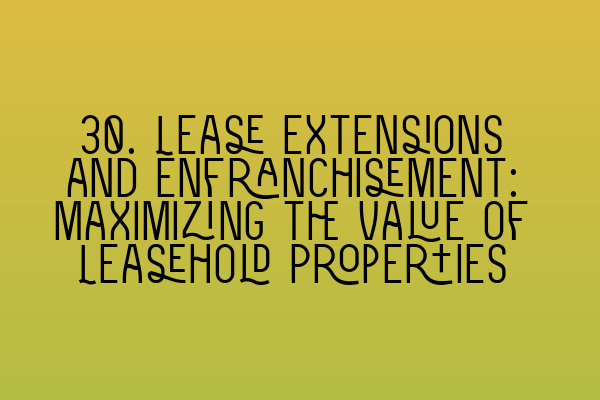Lease Extensions and Enfranchisement: Maximizing the Value of Leasehold Properties
When it comes to leasehold properties, understanding the dynamics of lease extensions and enfranchisement is crucial in maximizing your property’s value. Whether you are a property owner, a buyer, or a solicitor assisting clients in property transactions, having a comprehensive understanding of these legal processes can make a significant difference in the outcome of your investments.
In this article, we will delve into the intricacies of lease extensions and enfranchisement, uncovering the various aspects, benefits, and challenges they entail. Let’s explore how these processes can help maximize the value of leasehold properties.
What is a Lease Extension?
A lease extension is a legal process that allows the leaseholder to extend the term of their lease, providing them with extended rights and security of tenure. Lease extensions are particularly relevant for leasehold properties, where the ownership of the property is subject to a lease agreement with the freeholder.
Leases typically have a limited term, commonly ranging from 99 to 125 years. As the lease term diminishes, the value of the property may decrease, making it essential for leaseholders to consider extending their lease to maintain and potentially enhance the value of their investment.
Benefits of Lease Extensions
Lease extensions offer numerous benefits for both leaseholders and potential buyers. Here are some of the key advantages:
- Increased Property Value: Extending the lease can increase the property’s market value, making it an attractive proposition for potential buyers. A longer lease term provides greater security and confidence for buyers, ultimately driving up the property’s value.
- Security of Tenure: A lease extension grants leaseholders the reassurance of prolonged occupation and the ability to plan for the long term. This stability reduces the risk of displacement or having to negotiate unfavorable lease terms in the future.
- Mortgageability: Mortgage lenders often require a minimum lease term for properties to be eligible for financing. By extending the lease, leaseholders make their properties more attractive to lenders, facilitating mortgage approvals for potential buyers.
- Control of Maintenance and Service Charges: Leaseholders who extend their lease gain greater control over maintenance and service charges. With an extended lease, leaseholders have more say in how their building’s communal areas are managed, ensuring their investment is well maintained.
The Process of Lease Extension
The process of lease extension involves several key steps, including:
- Eligibility: To be eligible for a lease extension, leaseholders generally need to have owned the property for a minimum period of two years. However, it is essential to seek legal advice to confirm eligibility and understand any specific requirements.
- Valuation: The leaseholder and the freeholder need to agree on the premium for the lease extension. A specialist valuer can help with assessing the premium, taking into account factors such as property value, lease length, ground rent, and market conditions.
- Serving a Notice: The leaseholder serves a formal legal notice, known as a Section 42 Notice, on the freeholder. This notice expresses the leaseholder’s desire to extend the lease and sets out the proposed terms, including the premium.
- Negotiation: Following the service of the Section 42 Notice, negotiations between the leaseholder and the freeholder may take place to agree on the terms of the lease extension. This stage can involve counter-notices and discussions to reach a mutually acceptable agreement.
- Formalizing the Extension: Once the parties reach an agreement, the lease extension is formalized through a Deed of Variation. This legal document amends the terms of the lease, extending the lease term and reflecting the agreed-upon terms and premiums.
It is crucial to engage the services of a knowledgeable property law solicitor specializing in lease extensions to guide you through this complex process and ensure your rights are fully protected.
Enfranchisement: A Collective Option
Enfranchisement is another process that can maximize the value of leasehold properties, particularly for multiple leaseholders within the same building.
Collective enfranchisement allows a group of leaseholders to collectively purchase the freehold interest in their building, effectively gaining control and ownership of the property. This can bring various benefits, including:
- Increased Control: By collectively owning the freehold, leaseholders can exercise greater control over the management and maintenance of their building. They can make decisions collectively, reducing dependency on the freeholder’s judgment.
- Long-Term Stability: Owning the freehold provides long-term stability and security for the leaseholders. The risk of disputes with the freeholder, rising ground rents, or unfavorable lease terms is greatly reduced.
- Creation of Additional Value: Enfranchisement can add significant value to leasehold properties. By owning the freehold, leaseholders have more control over future development, refurbishment, and potential income generation from the building.
Similar to lease extensions, enfranchisement involves a detailed legal process. Leaseholders need to comply with strict eligibility criteria, follow statutory procedures, and handle negotiations and valuations. Seeking professional legal advice is crucial to navigate this complex process successfully.
Conclusion
Lease extensions and enfranchisement are valuable legal processes that can have a significant impact on maximizing the value of leasehold properties. Whether you are a leaseholder looking to secure your tenure and increase the market value of your property or a potential buyer considering the purchase of a leasehold property, these processes offer important benefits.
Understanding the intricacies of lease extensions and enfranchisement and seeking professional legal advice from property law solicitors specializing in these areas is vital in ensuring a smooth and successful outcome. By taking the necessary steps to maximize the value of your leasehold property, you can make informed decisions and invest wisely in the real estate market.
Related Articles:
SQE 1 Practice Exam Questions,
SQE 1 Practice Mocks FLK1 FLK2,
SQE 2 Preparation Courses,
SQE 1 Preparation Courses,
SRA SQE Exam Dates
